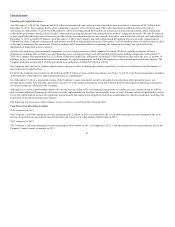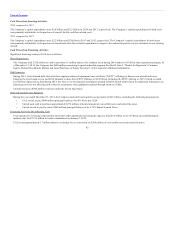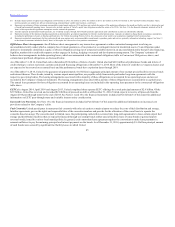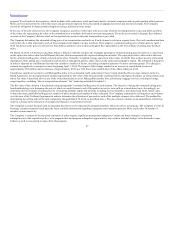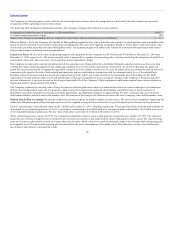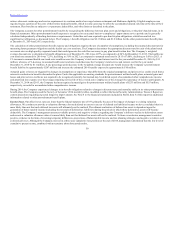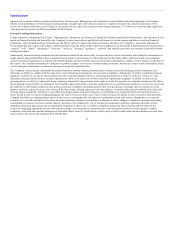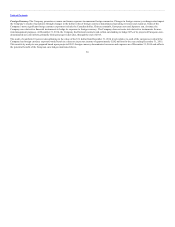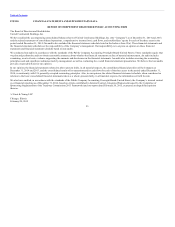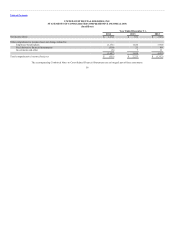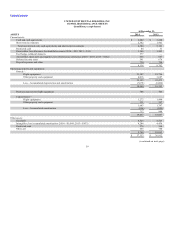United Airlines 2014 Annual Report Download - page 51
Download and view the complete annual report
Please find page 51 of the 2014 United Airlines annual report below. You can navigate through the pages in the report by either clicking on the pages listed below, or by using the keyword search tool below to find specific information within the annual report.
Table of Contents
supports the conclusion that the valuation allowance is still necessary. Management will continue to evaluate future financial performance to determine
whether such performance is both sustained and significant enough to provide sufficient evidence to support reversal of the valuation allowance. If we
reverse the valuation allowance, we will begin to record income tax expense at an effective rate of approximately 37%. However, we will not pay significant
cash taxes until we utilize our NOL carryforward of $9.6 billion.
Certain statements throughout Part II, Item 7, Management’s Discussion and Analysis of Financial Condition and Results of Operations, and elsewhere in this
report are forward-looking and thus reflect the Company’s current expectations and beliefs with respect to certain current and future events and financial
performance. Such forward-looking statements are and will be subject to many risks and uncertainties relating to the Company’s operations and business
environment that may cause actual results to differ materially from any future results expressed or implied in such forward-looking statements. Words such as
“expects,” “will,” “plans,” “anticipates,” “indicates,” “believes,” “forecast,” “guidance,” “outlook” and similar expressions are intended to identify forward-
looking statements.
Additionally, forward-looking statements include statements which do not relate solely to historical facts, such as statements which identify uncertainties or
trends, discuss the possible future effects of current known trends or uncertainties or which indicate that the future effects of known trends or uncertainties
cannot be predicted, guaranteed or assured. All forward-looking statements in this report are based upon information available to the Company on the date of
this report. The Company undertakes no obligation to publicly update or revise any forward-looking statement, whether as a result of new information, future
events, changed circumstances or otherwise, except as required by applicable law.
The Company’s actual results could differ materially from these forward-looking statements due to numerous factors including, without limitation, the
following: its ability to comply with the terms of its various financing arrangements; the costs and availability of financing; its ability to maintain adequate
liquidity; its ability to execute its operational plans and revenue-generating initiatives, including optimizing its revenue; its ability to control its costs,
including realizing benefits from its resource optimization efforts, cost reduction initiatives and fleet replacement programs; its ability to utilize its net
operating losses; its ability to attract and retain customers; demand for transportation in the markets in which it operates; an outbreak of a disease that affects
travel demand or travel behavior; demand for travel and the impact that global economic conditions have on customer travel patterns; excessive taxation and
the inability to offset future taxable income; general economic conditions (including interest rates, foreign currency exchange rates, investment or credit
market conditions, crude oil prices, costs of aircraft fuel and energy refining capacity in relevant markets); economic and political instability and other risks
of doing business globally; its ability to cost-effectively hedge against increases in the price of aircraft fuel; any potential realized or unrealized gains or
losses related to fuel or currency hedging programs; the effects of any hostilities, act of war or terrorist attack; the ability of other air carriers with whom the
Company has alliances or partnerships to provide the services contemplated by the respective arrangements with such carriers; disruptions to its regional
network; the costs and availability of aviation and other insurance; industry consolidation or changes in airline alliances; competitive pressures on pricing
and demand; its capacity decisions and the capacity decisions of its competitors; U.S. or foreign governmental legislation, regulation and other actions
(including open skies agreements and environmental regulations); labor costs; its ability to maintain satisfactory labor relations and the results of the
collective bargaining agreement process with its union groups; any disruptions to operations due to any potential actions by its labor groups; weather
conditions; and other risks and uncertainties set forth under Part I, Item 1A., Risk Factors, of this report, as well as other risks and uncertainties set forth from
time to time in the reports the Company files with the SEC.
51


